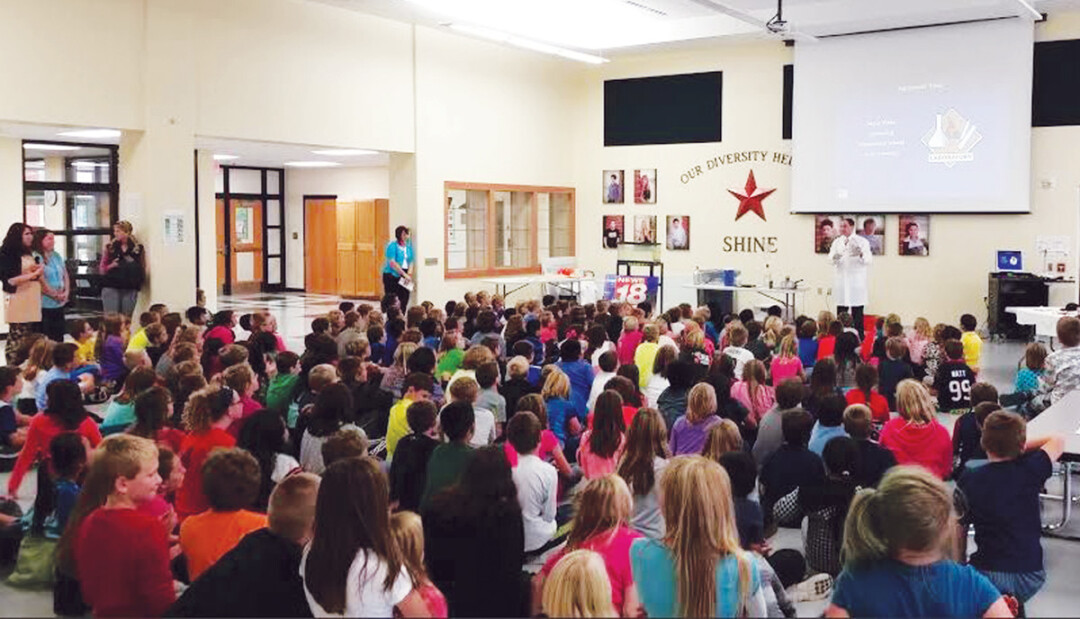Look Up! learning about the weather

We all know it. The weather in Wisconsin can be … hmm … difficult. Sometimes.
One day you could be enjoying a sunny, warm grill-out with your friends and the next morning you wake up to 6 inches of slush on the road. Thunderstorms whip up without warning, and freak rainstorms have frequently ruined many a perfectly planned beach day.
Perhaps there isn’t a better place to experience all kinds of weather than right here in our Midwestern home. When I think about exactly how much I know about weather patterns, I’m left with not much more than “It looks cold” or “Wow, should I be worried about this hurricane?” Yeah, not much.
“I always get a big chuckle when the kids raise their hand and say ‘I saw you on TV last night!’ Or when, after I finish my presentation and ask for any questions, someone asks, ‘So how much money do you make?’ ”
– Darren Maier chief meteorologist, Skywarn 13 Weather
But some local TV stations refuse to let today’s youth go out into the world without first teaching them proper weather basics – from science to safety – right in their classrooms.
“Many times we are in awe of the weather knowledge these kids have,” says WQOW News 18 meteorologist LeAnn Lombardo. “The teachers are doing a great job teaching the kids about all the different elements that make up the weather. (The students) love telling us their stories and they also love learning about our jobs.”
Since 2005, WQOW has been bringing a program called Weather Academy – headed up by meteorologists such as Lombardo, Andrew McCawley, and Nick Grunseth – to local schools for special assembly presentations and Q&A sessions. Students have the opportunity to learn about the science behind some of our state’s trickiest weather events – such as floods and snowstorms – and also to understand more serious storms like tornadoes and sever thunderstorms.
Plus there’s always the exciting chance that the kids will end up on live TV.
“During one experiment, which demonstrates pressure, we suck an egg into a milk bottle and they always get a kick out of that,” Lombardo said. “I think the two things they enjoy the most are the experiments and being on live TV.”
Similarly, WEAU will send a Skywarn 13 Weather meteorologist out to schools not only to teach them about weather but also to give the students a taste of how the station produces weather segments for live TV using green screens and such.
WEAU’s Chief Meteorologist Darren Maier told me that he tends to have just as much fun as the kids when he makes visits.
“I always get a big chuckle when the kids raise their hand and say, ‘I saw you on TV last night!’ Or when, after I finish my presentation, someone asks, “So how much money do you make?’ ” Maier said. “I thoroughly enjoy going to make these visits. Kids are so fun, and most are eager to listen and learn. The real young ones typically like to tell ‘stories’ of storms they remember or something that happened. They always make me laugh and smile.”
And there’s always a few students with a particular interest in weather science, and the experts’ advice for these would-be future meteorologists and climatologists is to absorb as much math and science education as possible.
“I, of course, try to be encouraging,” Maier said. “I know the feeling – when you have the interest that young, it’s in your blood for life!”
Schools interested in signing up for a visit from a local meteorologist can check out weau.com or wqow.com for more details. And be careful! You never know when some crazy weather might happen out there…




















